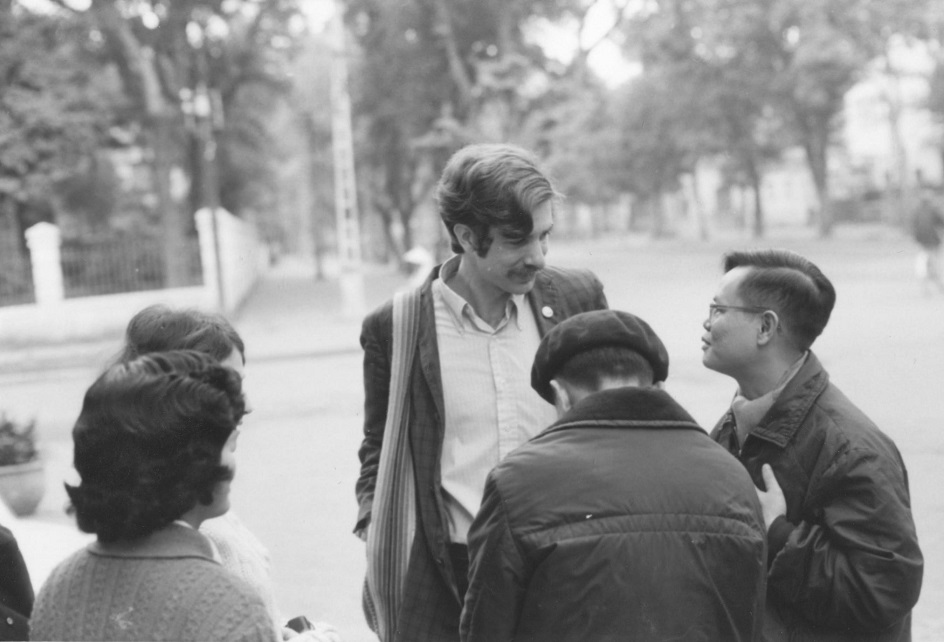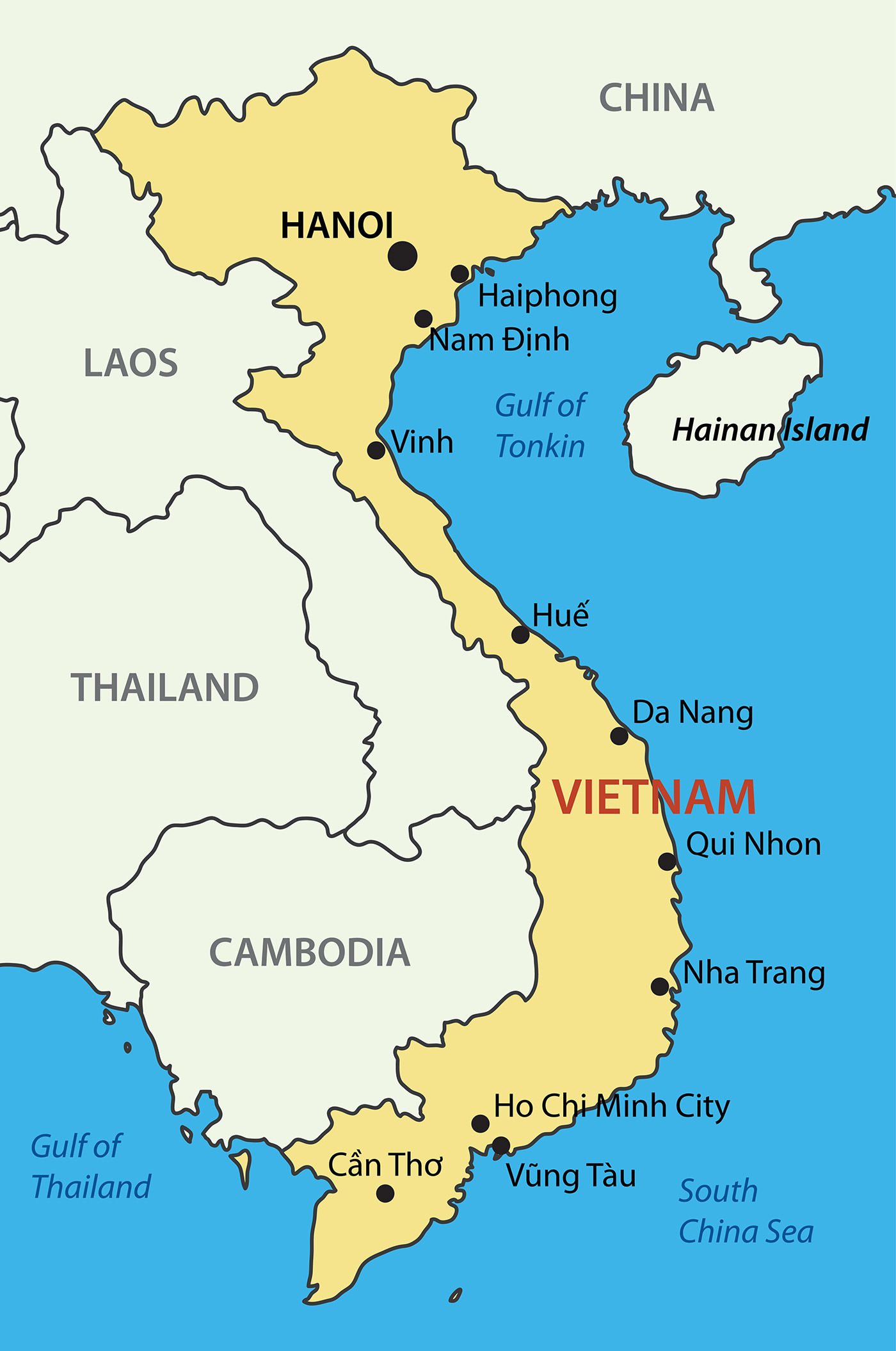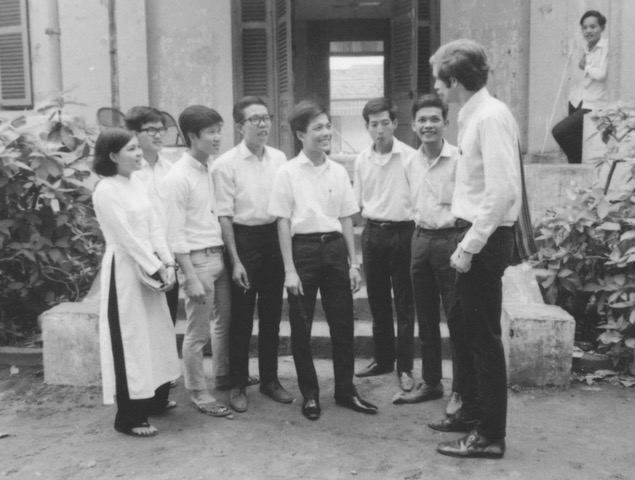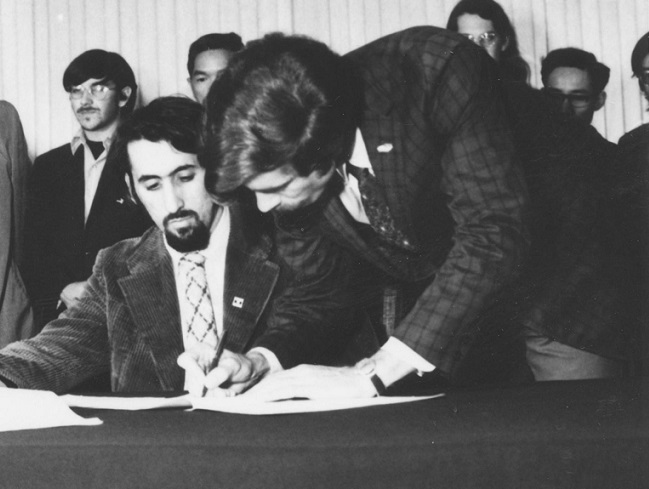
By Doug Hostetter
29 November ‘70

This is a transcription of Doug Hostetter’s tape recorded journal on the National Student Association People’s Peace Treaty delegation to Saigon and Hanoi in 1970
Everything happened so fast that I am only now beginning to feel the impact, but this is actually the moment that I have been living for the past year and a half. So I was not really too shocked when the opportunity came to, came to go back to Vietnam. I was shocked at the political potential for the new trip and the central role which it looks like I will be playing. This trip does likely mirror the changes which have taken place in myself over the past four years. Four years ago, I was only ready for VNCS [Vietnam Christian Service], now I feel I am ready although not adequate to meet the challenges of this trip. There are a few more uncertainties in this trip than what I would prefer. Like everything is almost completely open, and just about everything or anything could happen, and a lot depends on what I do and what happens to me and the people I meet. I can only say that like I did four years ago, that I personally feel inadequate for the task, but I have some faith that I am where I should be and that I am attuned to the Universe and that things will happen around me, if not through me. I must endeavor to maintain sensibility to life, the world, and myself. The rest should fall into its proper place. We are now ready to take off for the last leg of the trip – Saigon – where perhaps the most crucial aspect of the trip rests.
1 December ‘70
Saigon, Vietnam
Everything has worked so well in the past several days, that I can hardly believe it. I got through customs without any trouble or questions, and was able to make good contacts on the very first night. Everyone said that I would never be able to get an extension of my three-day visa, but yesterday I just walked into the police station and talked with the immigration police, and they said I could have a fifteen-day extension. So I might even make it up to Tam Ky. Things in Vietnam don’t seem to have changed all that much. People are perhaps a little more open in their being able to talk openly about peace and their anti-American feelings. I had a fantastic, unsolicited, talk with a cab driver the very first night. It was very beautiful. Kind of like:
You Americans can do what you want, eventually you will have to withdraw just like the French after eighty years. You can bomb all you want, we will just fill up the holes and continue as before. Bring in all the troops you want. Eventually, you will have to leave and still we will be here. You can bring all the money you want, and you can buy some Vietnamese, but you can’t buy their hearts. You might be able to buy Vietnamese woman for a night. You might be able to get her to marry you, but when you get on that plane, to go back to the States, she won’t be on the plane with you. Whatever you do, eventually you are going to have to leave, and we will still be here. In the end, Vietnam is ours.
2 December ‘70
Saigon

Everything is going just about as great as I could expect. I got a seven-day extension of my visa today, without any hassle so plans seem to be gelling. I leave tomorrow morning, with Brennan, on a military flight to Chu Lai, and then, we’ll come back on Saturday, two days later. The stay is a lot shorter than I had wanted, but the Saigon students want me back for a party on Saturday PM, and I guess I it is just as well since I have to leave for Laos on Tuesday. Things are going well with the students, and the amazing thing is that I haven’t been discovered yet. Tonight I spent a very enjoyable evening with Brennan, taking apart and breaking an M1 carbine a 45-caliber machine gun, which were left in his apartment.
10 December ‘70
Vientiane, Laos
Wow! Everything has been going better than I, than I could have expected. I spent a beautiful two days in Tam Ky, and then came back to Saigon for a couple of days and tried to fly to Vientiane. But my visa was messed up so I waited a day and got it fixed up and then got into here yesterday. My two days in Tam Ky were some of the most enjoyable days of my life. I’ll never forget the evening spent at Ky Phu and I rode out on Buu’s Honda, the first evening. There was a soft monsoon rain falling as we rode out through the green paddies. We had to wait at the river’s edge for about half an hour for the man from the far side of the river to hear us calling and come over and pick us up.
Just standing there in the late afternoon and watching the sunset and the rain fall on the flooded fields was almost a religious experience. That night Buu had invited a group of friends and relatives to come to his house. We all sat around the kerosene lamp and talked about what they thought should be in the peace treaty and how they thought we could make peace in Vietnam. There were people who had husbands, sons, brothers, or fathers in the north, fighting in the mountains, or fighting in the mountains in the south for the PRG [Provisional Revolutionary Government], and likely some had relatives in the ARVN [Army of the Republic of Vietnam]. But everyone was together in the desire for the Americans to leave and that there be peace in Vietnam.
They were really excited about my going to the north and the idea of a people’s peace treaty. They all liked the idea of a people’s peace treaty. They all sent greetings to the people of the North. Back in Saigon, they had a fantastic student rally on Saturday and Sunday nights. It was the boldest anti-war statement I have seen anywhere in Vietnam, done by students. The themes were a Vietnam national unity and peace. Culture was vividly portrayed along with the police corruption, the brutality and military oppression of the peasants by the ARVN. Also interesting to note, they were very careful to have costumes of both North and South Vietnam on the singers. I got here yesterday and met Carl Strock almost immediately, and later in the evening, I met Don Ronk, Mike Marow, and Gary Porter. Vientiane is such a small place that you meet almost everyone as soon as you get here.
I went out to the DRVN embassy as soon as I got in and had a really good talk with somebody from the ambassadorial staff. I was a little worried if they would give me a visa, if they realized that I had worked in the South for three years and spoke Vietnamese. I think that this is the first time that anyone [American] who spoke good Vietnamese has gotten into Hanoi. It should really give me something to compare the culture in the North with, but in talking with the ambassador here in Laos, I informed him that I had worked in the South and he assured me that I would be welcomed by the people of the North. The whole thing seemed like a dream, but I have just received the last of my legal papers and the Aeroflot [Russian Airlines] ticket leaves tomorrow morning, at seven fifty. Everyone here in Vientiane, press people, are excited about the trip and the new possible insights that may come of the trip.
7:00 pm
11 December ‘70
Vientiane
Last evening was one of the most surrealistic evenings that I have ever spent. About five o’ clock, after finishing getting all of the visa extension and entry papers finished, I stopped in at the Constellation Hotel to see if Mike Marow was there, yet. When I got there, Don Ronk told me that a police colonel was in and asked Jim Doherty if he were Doug Hostetter. So I hustled back to the hotel. When I got there, Jim Doherty and Mike Ing said that the police had been there and had come into their room and asked them for their passports. They had come back to the Settha Palace before the police had arrived, and picked up my folder of papers and duffel bag and brought them over to their room. As I sat in their room I took out everything which had any Vietnamese names on it, except a book of poetry by the students and went back to my room. About five minutes later, there was a knock on my door and the police colonel and four other men were standing outside. They identified themselves as police and requested to come in and search my luggage. I asked them what they wanted to search for, and they said that one of their agents had informed them that I had illegal documents, and then he stopped and backtracked – illegal articles he said – among my luggage. I asked what the articles were, and they refused to say. I gave them permission, and they went meticulously through my whole suitcase and then went through my duffel bag.
It was very interesting – what they picked out. My military postcards, which I had bought in the PX [military store] in the airport lounge in Saigon. Eldridge Cleaver’s Soul on Ice, my map of Saigon – it had a list of social service agencies typed in the back by VNCS. My address book, my book of photographs taken in the South. Of the papers, it was interesting what they were interested in. I had a copy of Nixon’s five-point program, the NLF ten-point program, and the latest PRG eight-point program. They took only the PRG eight-point program. The Kennedy Committee studies of the refugee problem in Laos, they were not interested in. But they were interested in the Mennonite peace treaty and the statement from the Minneapolis Conference, both of which had enclosed Vietnamese translations. They were also interested in the Women’s Letter to Agnew, the student statement on American bombings, and the students’ open letter to all peace-loving peoples, and a bunch of innocuous clippings and articles. For example, Duc’s statement in Paris and an article, which I wrote in Saigon. They then asked permission to study these for a couple hours. I said they could take all except my journal and address book, which were personal, and they agreed to allow me to be present as they looked through it. They agreed. So we took it to the national uh police headquarters and went up to the forth floor offices of the police general, commissioner of the police. We sat there for a little while, doing nothing, until the police colonel put the collection of material carefully in his file cabinet and said that we would go out to supper on him. I agreed, and he carefully locked the door and we left. As we started down the steps, I requested that we bring the material with us. He said it was not necessary since he had locked the office securely. We went to the Settha Palace, had a delicious meal with cocktails, venison, etcetera. Afterwards we went back to the police headquarters. This time there were five motorcycles outside the entrance with the two-way radios and various security-type people hanging around.
We went up to the office, where we had been before. When we entered, I saw that the air conditioner was on, and I thought it had not been on when we left. They asked permission to Xerox three things: the open letter from Saigon students, the letter from the women prisoners, and the Vietnamese translation of the statement from the Minneapolis Conference. He had one of his lackeys translate the article which I had written the second day in Saigon. I gave permission to Xerox everything but requested permission to tear the names off of the bottom of the Mennonite peace treaty [written by Mennonites in Saigon and given to me to take to North Vietnam], which they allowed. Then they said they were finished and gave me back all of my papers, and I signed a receipt that I had gotten them all back. When I returned to my room, I was looking through my notebook with the eight by ten colored photos and discovered, to my surprise, the last two pages had been replaced upside down. They’d evidently come into the office and taken all of the stuff and Xeroxed or photographed everything, while I had been out to supper. The funny thing was, that all the important material had been taken out, before they had gotten a hold of my papers, and they really thought they had gotten a hold of big shit.
12 December ‘70
Hanoi
Notes from the other group:

On the fourth of December, they went to see the one-pillar pagoda and the Buddhist temple. On the fifth, they met with Quat Xuan Tri (sp?) and got information. On the sixth, uh they divided into three groups and were asked questions about the American movement. They visited the military museum, museum of history, and the circus. Seventh, they went to Ninh Binh province and talked with the province chief, viewed church bombings in the province, bombings in 1966. On the eighth they went to see a cooperative farm, visited with the young pioneers, saw textile production, the Ha Tay farm, visited a grade school talked with some of the people in the youth movement. They were given the three readinesses: readiness to fight, readiness to participate in production, readiness to go anywhere the country needs. Visited a daycare center. The village tries to be self-sufficient. State gives some scholarship for university studies. Hospital that had been completely destroyed. Founded in 1954 and destroyed in 1965.
Continuation
Eight o’ clock
12 December ‘70
Hanoi
University Student Union of Hanoi. This is the second time. (They had met once with the group before I got there). Hoan Ngoc Ha student of economic planning college, Xuan Duc Toan student of the general university, Kim Ha journalist, Cao Thoc Canh, and Le Tom, he is the secretary of the cultural activities of the Student Union. Mai Hien, foreign relations for the students. The questions in communication with South Vietnam, “Did they ask you to help them in any way?” I had responded, “They asked for no direct help but asked for support and in keeping them informed of what was happening in the American movement.” Second question: “Did the South Vietnamese request any other help.” Response: “No, they did not.” Another question: “Were there special requests of the North Vietnamese students from the students in the South?” I responded: “Negative, they were interested in building up communication and knowing what was happening in the North. They made no specific requests.” They asked for remarks on the struggle of the students’ movement in the South. I reported that the student movement in the South was not communist. It was nationalist, patriotic, and struggling for independence from the Americans and from the Saigon Thieu/Ky [S. VN President Nguyen van Thieu and VP Nguyen Cao Ky) government. Questions, “Can the students’ movement in the South be co-opted or bribed?” My response: “I do feel as though some of the students had been bought off or bribed already, [but]the group that remained, I think, was firm and solid.” Question: “How do you feel about the peace treaty that was given by the South?” Answer: “I thought the treaty was very good and had no problems with it.” Question: “How do you feel about Nixon’s latest press statement? This I referred other members of the group to reply.
Mai Hien speaking:
Although the political view of South Vietnam and the North are different, there is a mutual desire for peace, independence, liberation, and reunification. This this is the desire of all Vietnamese. Our life and situation is different, but what we need most is independence, and our war struggle for independence has been going on for a thousand years. We have always struggled against the aggressors – outsiders – and for independence. We will suffer all. All solutions must be viewed from the point of view of independence. This is true of all Vietnam. The students in the South have made two requests, immediate withdrawal of U.S. troops, a new government in the South. We agree that this is what is needed to bring independence. We place our hope in this treaty. We want you to bring this opinion to the United States. We feel that most common Americans also feel the same way. We will thank you for presenting this to the United States. Your trip will encourage us in this struggle. If Nixon continues aggression in the South, we will continue our struggle.
John Doherty replies:
“We will do our best to inform our people of what we have seen and felt. “
Quat speaking:
Relations of North and South students. . . [the tape of the journal ends here]